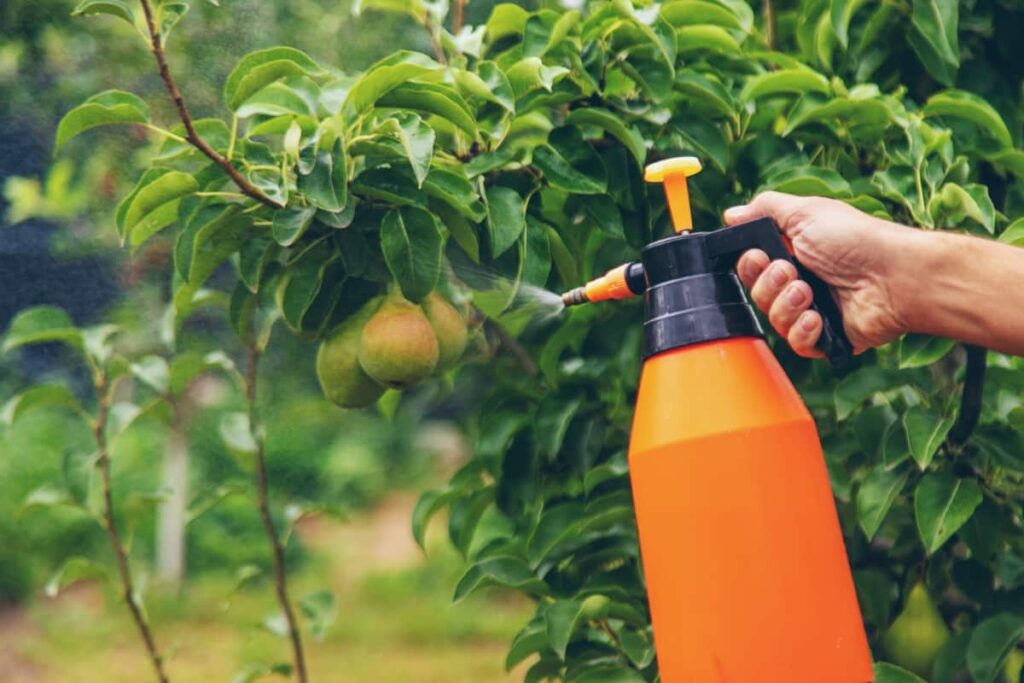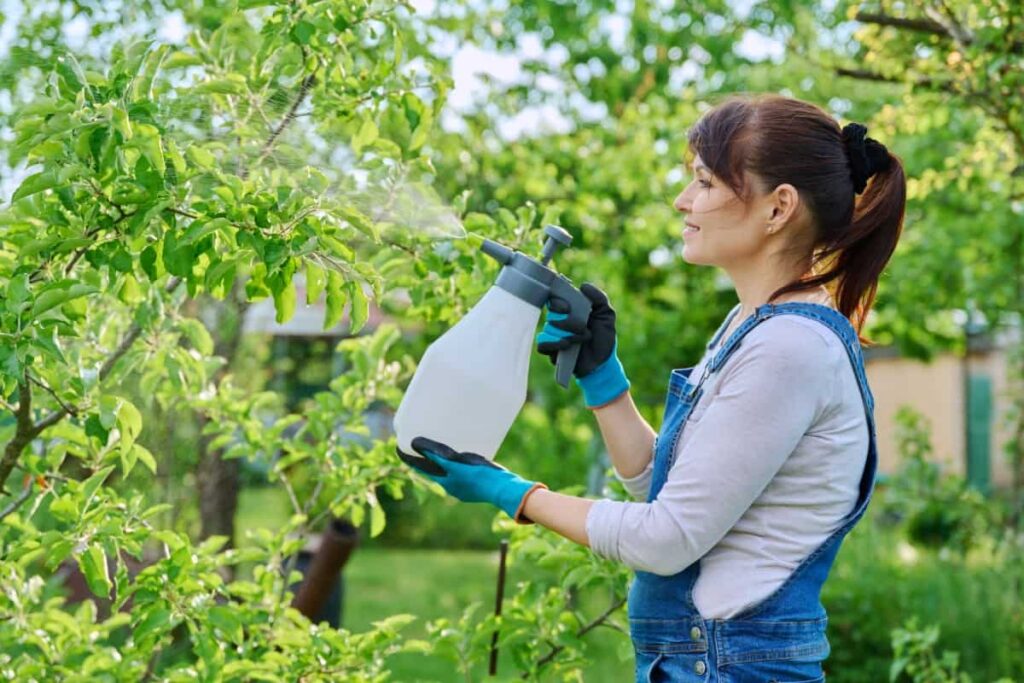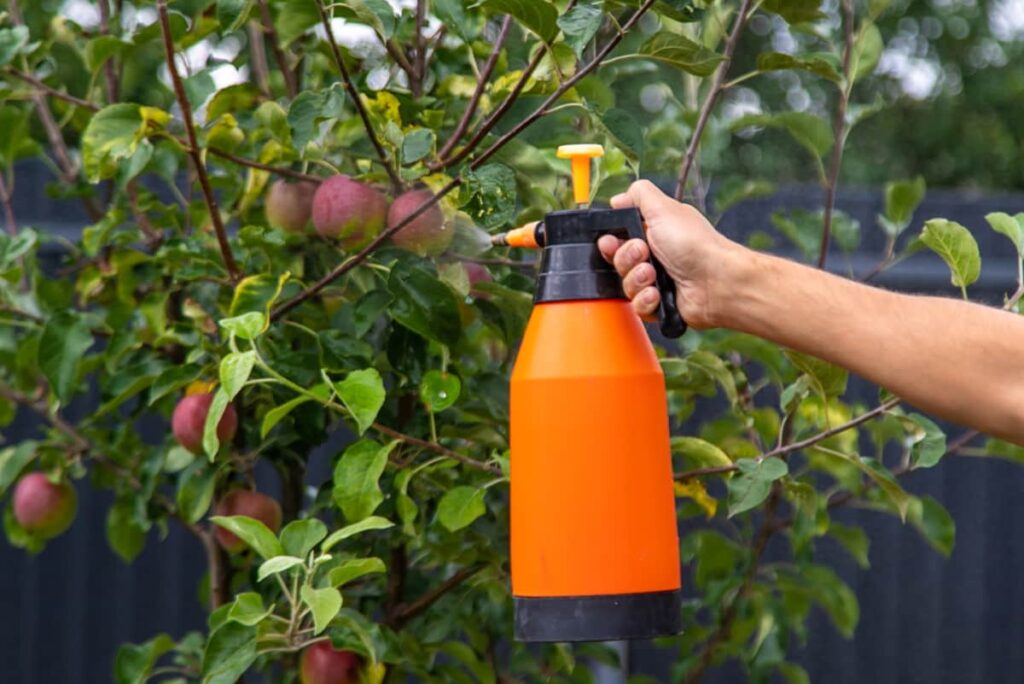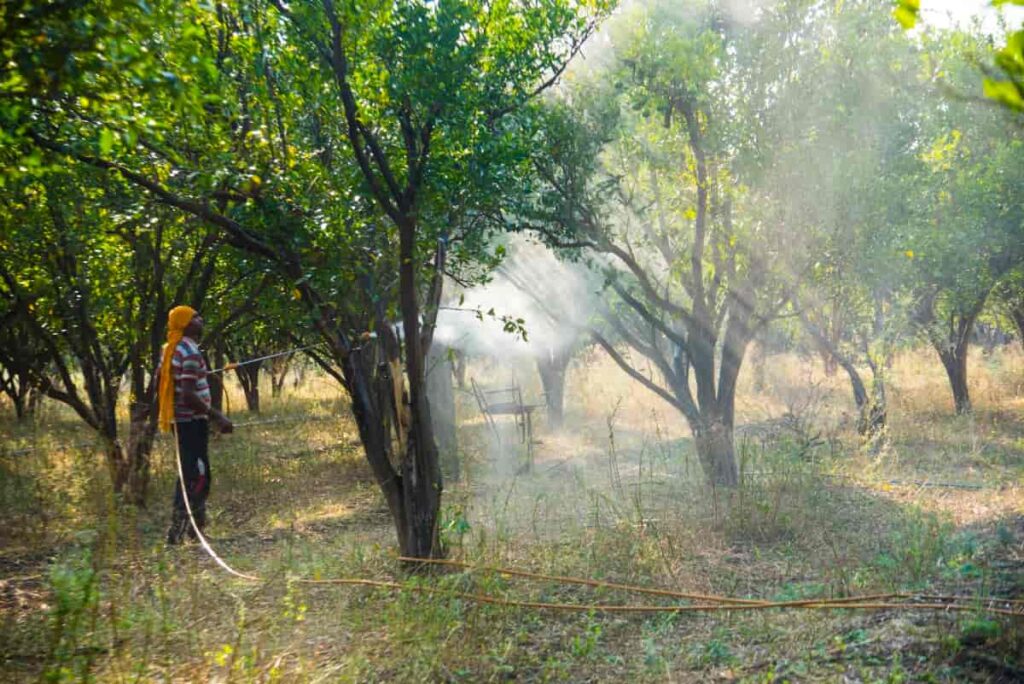Protecting fruit trees from insect pests is essential for ensuring healthy growth and abundant harvests. Fortunately, there are numerous natural pesticides available that are both effective and environmentally friendly. In this guide, we’ll explore the top 10 natural pesticides for fruit trees, including neem oil spray, kaolin clay solution, garlic and chili pepper mix, and more. These pesticides offer safe alternatives to chemical treatments, targeting pests while minimizing harm to beneficial insects and the environment.

10 Best Natural Pesticides for Fruit Trees
Neem Oil Spray
Application Techniques for Fruit Trees
Neem oil is extracted from the neem tree’s seeds and has insecticidal properties. It disrupts the insect’s hormonal balance, making it hard for them to feed, grow, or reproduce. It is effective against various pests, including aphids, mites, and caterpillars. Typically, you’ll mix around 2 tablespoons of neem oil with 1 gallon of water. Use warm water to help emulsify the oil.
Apply neem oil spray early in the morning or late in the afternoon when temperatures are cooler and beneficial insects are less active. Thoroughly spray the neem oil solution on all parts of the fruit tree, including the leaves, stems, branches, and fruit. Make sure to cover both sides of the leaves where pests may be hiding. Based on the severity of pest infestations, you may need to apply neem oil every 7 to 14 days throughout the growing season.
Kaolin Clay Solution
Protecting Fruit Trees from Pests and Sun Damage
Kaolin clay is a natural mineral that forms from the weathering of aluminum silicate rocks. When applied to fruit trees as a spray, it forms a white film on the leaves and fruit, which acts as a physical barrier to insect pests. Kaolin clay also has the added benefit of reflecting sunlight, which can help to reduce heat stress and sunburn on fruit trees. To make a kaolin clay solution, mix 1-2 cups of kaolin clay powder with 1 gallon of water and spray it onto the foliage of fruit trees using a pump sprayer.
Garlic and Chili Pepper Mix
Homemade Recipe for Pest Deterrence
Garlic and chili peppers contain compounds that are repulsive to many insect pests. To make a homemade garlic and chili pepper spray, crush several cloves of garlic and a few hot chili peppers and steep them in hot water for several hours. Strain the mixture and dilute it with water at a ratio of 1:10. Spray the mixture onto fruit trees, focusing on areas where pests are present. Reapply every 7-10 days or as needed. This mixture can help to deter pests such as aphids, caterpillars, and beetles.
Horticultural Oil
Seasonal Use for Dormant and Growing Seasons
Horticultural oils, also known as dormant oils, are highly refined mineral oils that are used to control overwintering pests such as scales, mites, and aphids. These oils work by suffocating the pests and disrupting their feeding and reproductive cycles. Horticultural oils should be applied to fruit trees during the dormant season when the trees have shed their leaves and are not actively growing. Be sure to follow the manufacturer’s instructions for dilution and application rates.
Beneficial Insects
Introducing Natural Predators for Pest Control
Introducing beneficial insects such as predatory mites, ladybugs, lacewings, and parasitic wasps can help control pest populations on fruit trees. These insects prey on common pests such as aphids, caterpillars, and mites, reducing the need for chemical pesticides. Beneficial insects can be bought from garden centers or online suppliers and released onto fruit trees at the first sign of pest infestation.
In case you missed it: 10 Best Natural Pesticides for Vegetable Garden: 100% Effective to Kill Bugs on Vegetable Plants

Bacillus Thuringiensis (Bt)
Organic Caterpillar and Worm Control
It is a natural soil bacterium that produces toxins that kill insect pests. Bt is effective against caterpillars and other leaf-eating insects, but it is safe for humans, animals, and beneficial insects. Bt products are available in liquid, powder, and granular formulations and should be applied to fruit trees according to the manufacturer’s instructions. Reapply every 7-10 days or as needed.
Fermented Tea Extracts
Boosting Tree Immunity and Pest Resistance
Fermented tea extracts such as compost tea and manure tea contain beneficial microorganisms that can help boost tree immunity and resistance to pests and diseases. These teas should be applied to the soil around fruit trees as a natural fertilizer and soil conditioner, promoting overall tree health and vigor. To make fermented tea extracts, steep compost or manure in water for several days to several weeks, then strain and dilute it with water before applying it to fruit trees.
Diatomaceous Earth
A Mechanical Barrier Against Crawling Pests
Diatomaceous earth (DE) is a natural, non-toxic pesticide made from the fossilized remains of diatoms. When applied to the soil around fruit trees, DE forms a mechanical barrier that effectively controls crawling pests such as ants, slugs, and beetles. The abrasive texture of DE damages the exoskeletons of pests, dehydrates them, and die.
Unlike chemical pesticides, DE poses no threat to humans, pets, or beneficial insects, making it a safe and environmentally-friendly option for pest control. To use DE effectively, apply a thin layer around the base of fruit trees, focusing on areas where pests are most active. Reapply after rain or watering to maintain its effectiveness. With regular use, diatomaceous earth provides long-lasting protection against crawling pests without harming the ecosystem.
Copper Fungicide Sprays
Organic Solutions for Fungal Diseases
Copper fungicides are derived from naturally occurring copper compounds and are used to control fungal diseases such as powdery mildew, leaf spot, and rust on fruit trees. Copper fungicides work by inhibiting fungal spore germination and growth, preventing the spread of infection within the tree. Copper fungicide sprays should be applied preventatively before the onset of disease symptoms and may need to be reapplied at regular intervals during the growing season.
In case you missed it: 10 Best Natural Pesticides for Indoor Plants: 100% Effective to Kill Bugs on Houseplants

Essential Oil Blends
Safe and Natural Insect Repellents
Essential oils like peppermint, eucalyptus, and citronella have insect-repellent properties and can be used to make homemade insect-repellent sprays for fruit trees. To make these essential oil sprays, mix several drops of your chosen essential oils with water and a small amount of liquid soap to help disperse the oils. Spray this mixture onto the foliage of fruit trees to repel pests such as aphids, ants, and beetles.
In case you missed it: 10 Best Natural Pesticides for Hibiscus Plants: 100% Effective to Kill Hibiscus Bugs

Conclusion
Incorporating natural pesticides into your fruit tree care regimen can help maintain a thriving orchard without relying on harmful chemicals. From neem oil to beneficial insects, these 10 natural pesticides provide effective solutions for controlling pests and promoting tree health. By choosing environmentally friendly options, gardeners can protect fruit trees while minimizing their impact on the ecosystem. Embracing natural pest control methods not only benefits fruit trees and their harvests but also contributes to a healthier environment for all.
- Aquaponic Farming at Home: A Step-By-Step Guide
- Profitable Village Farming Business Ideas in 2024
- High-Yield Aquaculture: Fast-Growing Fish for Farming
- Effective Fish Pond Construction Techniques for Beginners
- Irrigation and Water Management in Pineapple Farming
- Blossom to Harvest: Mastering Flowering and Pollination in Papaya Farming
- Pig Fattening Essentials: From Selection to Sale for Beginners
- Raising Wagyu Cattle: A Complete Guide for Premium Beef Production
- Soil Types and Their Water Holding Capacity
